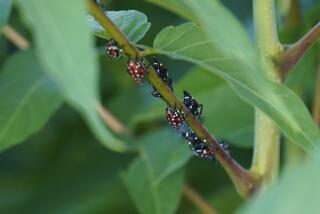6th ‘Killer Bee’ Colony Found, Destroyed : Hive 4 Miles From First Find in Lost Hills ‘Not Major Problem’
- Share via
State agricultural workers have found and destroyed a sixth colony of “killer bees” just four miles from the original find of Africanized bees in June, the state Food and Agriculture Department reported Saturday.
The department took the action Friday night, immediately after the U.S. Department of Agriculture’s Bee Breeding and Stock Center in Baton Rouge, La., confirmed that the hive contained Africanized bees, said Gera Curry, spokeswoman for the Food and Agriculture Department.
Federal officials in Baton Rouge said the presence of a sixth colony is no cause for additional concern. “We’re finding them at a very low frequency,” said Thomas Rinderer, director of the center in Baton Rouge. “I haven’t yet found anything to indicate there is a major problem.”
Sprayed and Sealed
State agricultural workers killed the Africanized colony by spraying the hive with insecticide and then sealing it, Curry said. The hive was part of a commercial apiary near Interstate 5 about 41 miles northwest of Bakersfield. The 100 remaining colonies in the apiary have been sampled, and test results are pending.
The department has sampled hundreds of bee colonies within a 462-square-mile quarantine area in Kern County. The center of the area is Lost Hills, where an oil worker discovered the first colony of Africanized bees in June, Curry said.
Commercial hives cannot be moved outside the quarantine area until they are studied and found to include only ordinary honeybees, Curry said. Scientists do not expect to finish the complicated testing process until early October, she added.
Anatomical Details
The department is conducting intricate anatomical tests on 50 bees from each hive in a mobile laboratory in Bakersfield, she said. The testing includes determining the length and weight of the wings and the weight of a hind leg bone, Curry said.
Researchers send slides of bees suspected of being Africanized to an entomology professor at the University of California, Berkeley, and finally to Rinderer at the bee center in Baton Rouge, she said.
Africanized bees were dubbed “killer bees” because they are more ferocious than the European varieties and are known to attack en masse if their nests are disturbed. But last month, a panel of bee experts said the ill-tempered characteristics of Africanized bees could be expected to disappear as they mate with European honeybees in Kern County.
Africanized bees are a result of a 1956 breeding experiment in South America that crossed African bees with European varieties. Some of the hybrid bees escaped, started their own colonies and began moving north at a rate of 200 miles a year.
More to Read
Sign up for Essential California
The most important California stories and recommendations in your inbox every morning.
You may occasionally receive promotional content from the Los Angeles Times.













